Interview: Composer David Majzlin Talks Musical Tale BEL CANTO
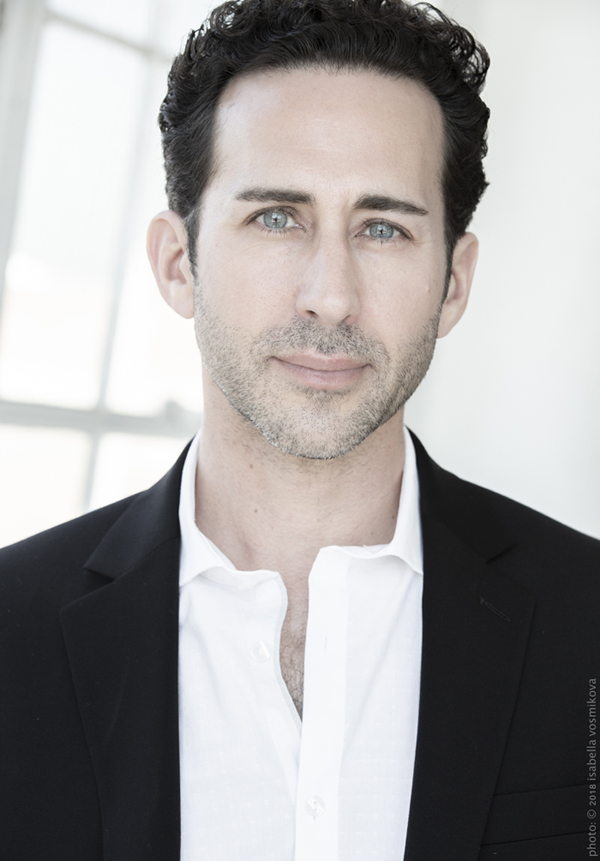
David Majzlin is a highly accomplished composer writing for entertainment projects such as Mozart in the Jungle, Sunshine Cleaning, Ugly Betty, and The Tony Awards. He recently wrapped on the new film Bel Canto starring Julianne Moore and Ken Watanabe and featuring the singing talents of Renee Fleming. Majzlin took a moment to chat with BroadwayWorld about his contribution towards the world of the film and telling a story of connection through music and art.
How did you get involved with this project?
The project was brought to me for consideration, I didn't seek it out. It came to me from music supervisor Susan Jacobs. She's great and has this really interesting insight into how to use music in film, how to use it to tell a story. I've known her for a very long time, we've worked on a bunch of projects together, so I know that when Sue calls it's going to be something cool and challenging, she really thinks outside the box.
How is your score structured and how does it meld the different musical influences in the film, the classical world and Latin American elements?
The score is basically three parts of a sonic palette. The first part is a string ensemble, more traditional. That part of the score represents the opera world. The story is full of these dichotomies of the ragtags versus the rich and the rebels versus the elite political figures. There are these great dichotomies that are really timeless, especially now when you see what's going on with all sorts of divides. The rich and poor divide through opera in this film is a really interesting angle, and it's one of the reasons I really love the story. So the first part of the score is this orchestral, more classically based thing.
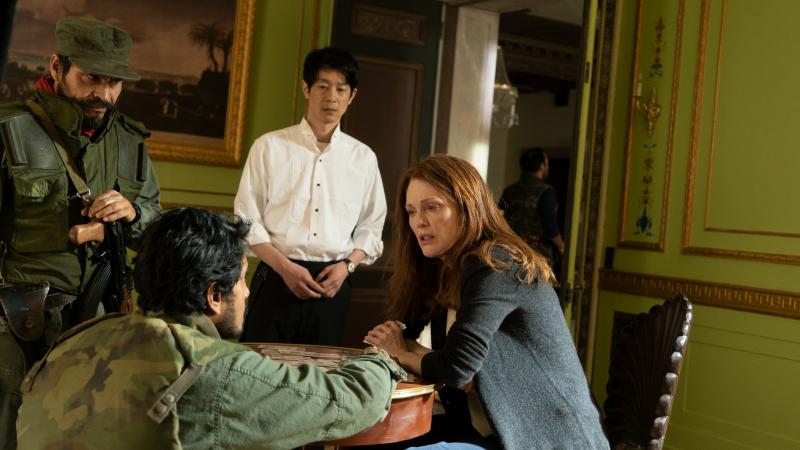
The second part of it is electronic and these elements have to do with surveillance because everyone is under surveillance. Technically everyone is being held hostage against their will, both the hostages who can't leave and the terrorists who can't leave. It's interesting while all these love stories are taking place, while everyone is getting to know each other and they're all connecting, we forget that at any moment there could be storms from the outside because there's constant surveillance on them. The electronic part had to do with that.
The third part was a fun little surprise. I found called the timple. In the very beginning of my involvement in the project, I hadn't been shown the film. They were considering a number of different composers, of course, and only told me what it was. I had read the book, knew the story, and I was very excited. For my audition/sketches, I focused a lot on the voice and on guitar, specifically classical guitar and Spanish guitar to join the Latin world and the classical world. The guitar is one of the most readily acceptable instruments to combine those two worlds because guitar is in all sorts of Latin music versus piano, which is really more of a European thing.
I met a girl who was moving to Mexico and selling things off before the move, and she happened to have this instrument. I'd never heard of it or played it before. It's a two foot long guitar strung with nylon classical strings and it's got this great magical sound. It's not a mandolin, not a guitar, not a ukulele, it's its own thing.
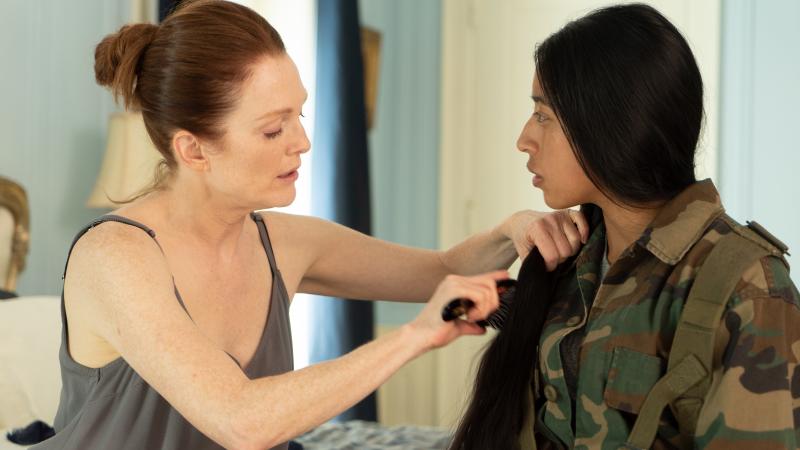 In the film there's this character named Carmen and she really stood out to me. There's this innocence to her, she looks like she's maybe 20 years old, and she's holding a machine gun. She doesn't even look like she knows how to hold a machine gun. She's just a kid who joined the rebel group who really doesn't know anything other than that. There's this toughness to her because she's a soldier but there's also this fragility. She even falls in love with one of her hostages. I was looking for an instrument that would cut through a score okay but that didn't sound like any specific Latin American country. For example, if you use a berimbau that's an instrument that's only from Brazil so it would be weird and culturally too specific. The timple for me represented Carmen and the rebels because it really cut through the sound in an interesting way.
In the film there's this character named Carmen and she really stood out to me. There's this innocence to her, she looks like she's maybe 20 years old, and she's holding a machine gun. She doesn't even look like she knows how to hold a machine gun. She's just a kid who joined the rebel group who really doesn't know anything other than that. There's this toughness to her because she's a soldier but there's also this fragility. She even falls in love with one of her hostages. I was looking for an instrument that would cut through a score okay but that didn't sound like any specific Latin American country. For example, if you use a berimbau that's an instrument that's only from Brazil so it would be weird and culturally too specific. The timple for me represented Carmen and the rebels because it really cut through the sound in an interesting way.
It's great that you found a way to bring in Latin American elements without being country specific and over influence the score.
It's important too to keep it simple. If we just say Latin, Latin is so diverse. If you go from Brazilian to Chilean music, it's totally different. The idea was to put myself in the headspace of the folk people, the people the rebels represent and to think simply in that way because folk music has this beautiful simplicity and doesn't get complicated. The opera world is far more complicated than they would ever experience on a folk level, so a lot of that was about that dichotomy and contrast with simple versus elaborate.
In the score the flavors that are Latin are very simple and subtle. The timple, Latin style classical guitar. There's a little percussion, things like conga and shakers, things that you hear in all sorts of Latin style music but nothing about the score sounds specifically Latin.
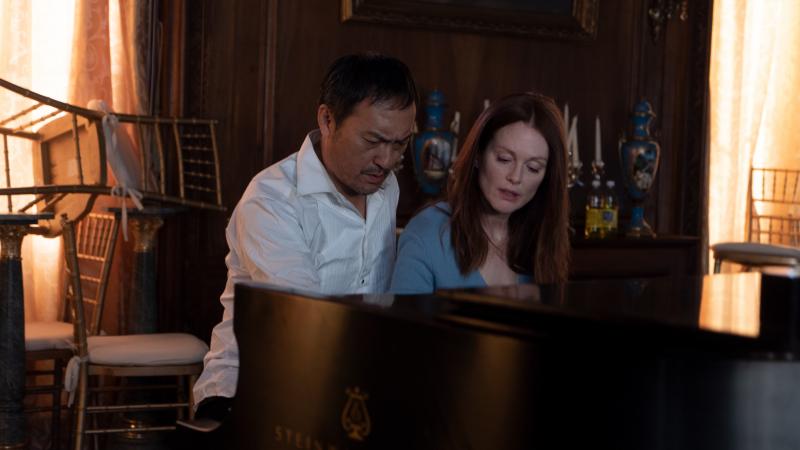 What was the collaboration like working with director Paul Weitz on building the score and then bringing in the talents of Renee Fleming?
What was the collaboration like working with director Paul Weitz on building the score and then bringing in the talents of Renee Fleming?
It turns out when I got the film, there was a piece in there that was very close to my audition demos that I didn't know even know was in there. The hardest part of being a composer can often be does the director hear something that they feel goes with the film or does he or she even know what does go with the film? Oftentimes they don't really know about music until the end. In this case, they already had a piece in there called the Bachianas and what's great is that's what I auditioned with, without knowing. That was what I felt the sound should be, and they were already thinking along the same lines.
The version used there was a pre-recorded one Renee had already sung, then I used her again as part of the score and, of course, she's used as the voice of Julianne Moore's character, so I was able to really incorporate her voice as an instrument. The parts she sings on the score that aren't arias are phonated, they're just vowels. In my head I think of it as a spirit, this spirit that moves through the house and then brings people together. I wanted it to be beautiful but also haunting, a bit unsettling. A force that says okay you better love each other now, because there's not a lot of time left, it's running out.
What's your process like when writing a score?
I sit down, and say I have no idea what I'm doing! When I first met Hans Zimmer he told me that, he said 'I have no idea what I'm doing.' That's the truth. It's a writer staring at a blank page. With that in mind, my process is first to understand the story because your music will change how the story is told. If you don't understand what the story is or what you're trying to say with the music, it can be very confusing.
The way I like to work with directors is to avoid talking about music and only talk about narrative. As we're working through the film I'll ask, 'why do you need music here, what is it about this scene that is lacking and needs music?' Most people would assume a composer would try for more music whereas I prefer to have less. The less there is, the more impact it has. If you're doing a film about music that then has performances, it can be really manipulative to bombard audiences with music everywhere. I ask why do you want the music here and if they're not sure, I try to encourage them to think about how they want the audience to feel. That's the most important thing to me, what is it we want to say that the film isn't saying already. If you're only emulating environments or adding something sad to a sad moment or happy music to a happy moment, it's not really saying anything or adding anything.
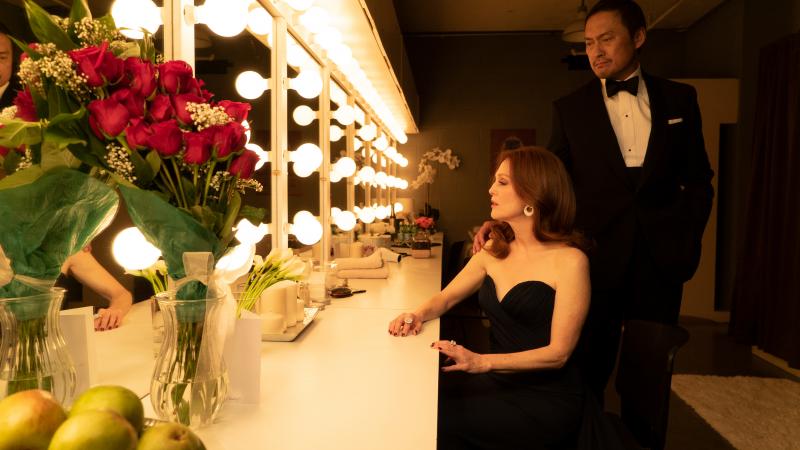
Based on Ann Patchett's best-selling novel, Bel Canto is a dramatic love story that follows a famous soprano (Julianne Moore) who travels to a military dictatorship in South America to give a private concert at a party for a wealthy Japanese industrialist (Ken Watanabe). Just as the glittering gathering of diplomats and politicians convenes, the mansion is taken over by a guerrilla rebel group demanding the release of their imprisoned comrades. Threats are made, lives are lost, a tense negotiation begins, and a month long standoff ensues. While they are confined to the house, the hostages and their captors, who speak different languages, are forced to find ways to communicate. Music, especially the beautiful arias performed by Moore's character, a songbird in captivity, sparks a shared sense of comradeship and even love, uniting the disparate housemates as they form unexpected bonds, overcome their differences, and discover their shared humanity.
Bel Canto is in select theatres now and available on select streaming sites including Amazon.
.png)
|
.png)
|
Videos


